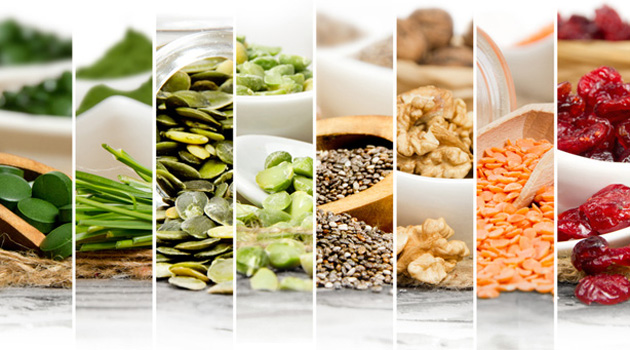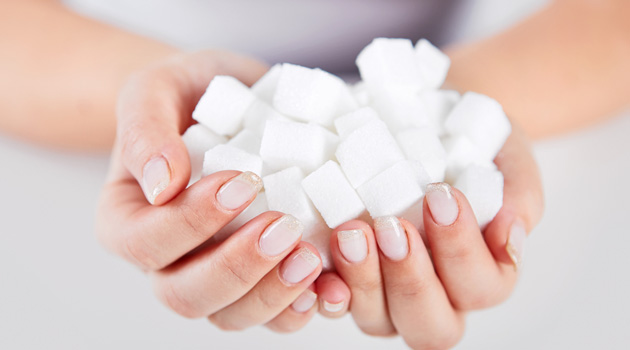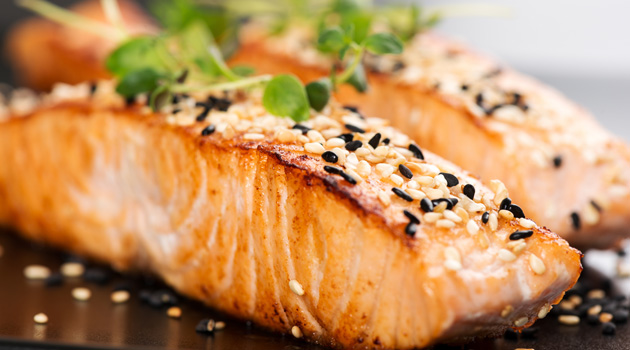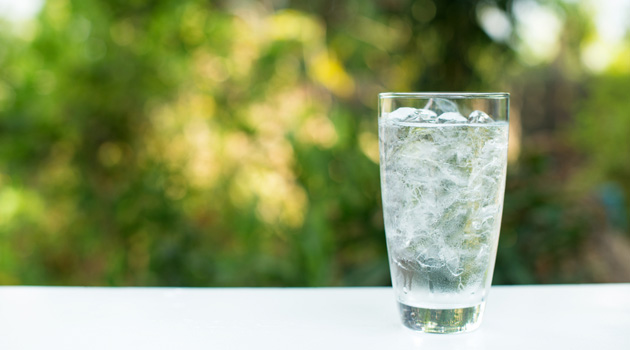Does Israel want full scale war in the Middle East?
Removing husband from care home ?


If you're suffering from a specific health issue, good nutrition could be the answer. Following our in-depth Q&A with nutritionist and dietitian Jane Clarke, here are some tips and advice on how to eat for health and use food to help with various health conditions ranging from dementia to IBS.
Dementia | Osteoporosis and arthritis | Psoriasis | Excess sugar consumption | Polymyalgia rheumatica | Fibromyalgia | Systemic lupus erythematosus (SLE) | Headaches and migraines | Stress | Anxiety | Anaemia | IBS | Involuntary belching | Menopause | Chemotherapy | Vasculitis | Insomnia | Chronic fatigue | Nasal congestion | Vision loss and AMD | High cholesterol
"What would you suggest about instances where people with dementia are eating too much? I know of one person whose husband, instead of forgetting to eat, will often forget that he has eaten so wants to eat almost constantly and is suffering as a result."
Overeating can be an issue for people living with dementia as the normal feedback mechanisms which we rely on to tell us when we are full, or have eaten, start to let us down. To reduce overeating:
For information on dementia and reducing the risk of developing this condition, see our page on reducing the risk of developing dementia through diet and exercise.

"What foods should women over 60 be eating to help prevent osteoporosis or slow down its progress? And are there any proven foods which improve the pain of osteoarthritis?"
We tend to think of our bones as being inanimate and something we can’t really influence, but in fact our skeleton is very much a living part of us. Bone cells are busy throughout our lives manufacturing new bone. The foods that help it do this are:
There are also things we need to avoid in our diet to maintain our bone health, namely too much alcohol, salt and caffeine.
When it comes to arthritis (osteoarthritis is the most common type of arthritis in the UK), there is more evidence indicating links to specific foods in the case of rheumatoid arthritis than in osteoarthritis, but those with the latter condition do report that some foods appear to aggravate it and others seem to ease their symptoms. The Mediterranean diet, packed with fresh fruits and vegetables, oily fish and not too much red meat, appears to be the best way of eating. Most people with arthritis often say they can’t eat too many oranges, tomatoes or other acid-producing foods, which make their joints feel worse.
Although cutting back on certain foods may be beneficial for people living with specific health conditions, exclusion diets should not be undertaken unless absolutely necessary and endorsed by your GP or specialist. There is a risk of them failing to cover your nutritional bases – plus, it’s just no fun to live on a hugely restricted diet.
"Two years ago I went on a very strict diet. Very very low in sugar - in fact, practically none. My doctor pooh-poohed it, but it has cleared my psoriasis up enormously. Was I imagining this? I don't think so but he said it was probably due to improve anyway!"
It’s true that the scientific evidence isn’t there to suggest that a very strict low-sugar diet is the cure for psoriasis, but we are all unique and you have found that it does work for your skin. Alternatives to a low-sugar diet include:

"Are the sugars found in fruit the same as processed sugars? I like to blend fruit and vegetables together, but sometimes it is mainly fruit. I often worry I might be consuming too many fruit sugars as I have a Nutribullet smoothie everyday for breakfast. What are your thoughts on sugar consumption?"
Sugars found in fresh fruits are superior to processed sugars as the fruit they are contained in will also provide you with valuable vitamins and micronutrients. Watch out for higher GI fruits like mango and pineapple as their sugar is absorbed rapidly into the bloodstream, but a freshly made juice or smoothie each day should be fine if you’re not eating too much sugar elsewhere in your diet.
A Nutribullet is a good option as it allows you to blend the whole fruit, rather than just extracting the juice; the additional fibre will help to slow the absorption of sugar into your bloodstream. But to reduce sugar consumption overall:
There are many low-calorie blood sugar diet recipes to try, as part of Dr Michael Mosley's 5:2 Diet.
"Last year I was diagnosed with polymyalgia rheumatica for which I need to take steroids. I was advised to eat carefully as I would be susceptible to type 2 diabetes. I have tried to reduce my sugar/carbs and cut down on potatoes and bread, but when I look at the ingredients on packages so many include sugar, even my one Weetabix a day. I do miss toast and marmalade. What are your thoughts on a low sugar diet and is bread bad for you? Finally I love fruit and plain nuts what sort of quantities per day can I eat?"
It is a good idea to think about what you’re eating to help reduce your likelihood of developing type 2 diabetes, but labels can be confusing.
The glycaemic index (GI) tells us how quickly a food raises blood sugar levels. High-GI foods include the obvious biscuits, sweets and cakes, but also bananas, melons, raisins, grapes, dates, mangoes and pineapples. Instead, focus on citrus fruits and stone fruits, such as apricots and plums. Instead of white rice and pasta, choose wholegrain versions which will have less of an impact on blood sugar levels and will also help you to feel fuller for longer, so you may eat less overall. Wholegrain bread surprisingly has a similar GI to white bread, so opt for rye or pumpernickel. If you want to enjoy that slice of toast, choose a granary loaf and a low-sugar, high-fruit content marmalade to spread on it.

"I'm wondering what your thoughts are about the impact of diet on fibromyalgia. Is there an approach you think can help to manage symptoms?"
"I have SLE and have read that some people believe a gluten-free diet helps to relieve the symptoms. Is there any evidence for this?"
Researchers are still investigating any relationship between systemic lupus erythematosus and gluten so there isn’t yet a definitive answer. However, many patients find that their skin rash lessens, and in some cases virtually disappears, as soon as they cut gluten from their diet. Gluten is found in wheat, rye and barley, so avoid products made with these grains. Instead, how about a stir-fry made with rice noodles, creamy chia seed porridge for breakfast or a delicious cake.

"I could do with some help on what to eat or not eat to prevent headaches and migraines. I know what people consider to be trigger foods, but I can't relate to them and wonder if there are any new ideas. I have arthritis but can't take nsai, and paracetamol gives me headaches."
The classic trigger foods are cheese, citrus fruits, chocolate, coffee and red wine, but these aren’t always a cause for some people.
Eating small meals regularly so that you’re not getting hungry can help, as can avoiding sugary foods, such as sweets and cakes, which can make our blood sugar levels wobble – it’s the blood sugar changes that can aggravate sensitive heads. For some people, taking a vitamin B2 and Co-enzyme Q10 supplement combination can decrease migraines, but check with your GP before starting any supplements as you want to make sure they don’t interfere with any over-the-counter or prescription medication you may be taking.
"I wonder whether there are any foods that are particularly helpful when it comes to stress? It's so tempting at these times to just go for things you fancy which are inevitably sugar-based, but I am interested to know whether there are foods that can actually help with the condition as well as bringing comfort simply by eating?"
You may also find that taking control of your eating, so that you feel empowered to look after yourself, is a first step to dealing with your stress.

"Some people say that they can't eat if they are stressed and then they lose weight, but I always have a longing for biscuits or cake if I feel anxious and I don't usually keep any in the house for that reason. My neutrophils are always on the low side due to medication. Do you have any tips for immune boosting foods which are easy to prepare?"
Avoiding temptation is a great idea, but also consider what foods you do want to have in the house to nourish your body at the moments you need it most.
Find out more about how to manage anxiety and panic attacks.
"I have iron deficiency anaemia and have had it most of my adult life (I'm now 60 years old). My problem is that the usual iron tablets, which do bring me back into the normal range, really upset my system, and although I eat a fairly vegetable heavy diet with a bit of red meat every three or four days, I'm obviously not getting enough iron into my system."
Iron-deficiency anaemia is very common and good to identify as so often we can just get used to feeling tired or off-par without checking in with a doctor, and sometimes extra investigation and reassurance is needed.

"Can you please advise me on what foods I should avoid. I have IBS. I've tried cutting out foods such as salad and onions, but it doesn't seem to make much difference."
Anxiety and stress can increase acid secretion in the stomach, which can change the way food is dealt with. We can become tense and less able to go to the toilet, leading to constipation. Or we may have to rush to the toilet when we’re worried. Anxiety can also lead us to skipping meals, eating on the run, or craving foods that trigger IBS symptoms.
"I've had a problem with belching for quite some time. I could even just have a sip of water first thing in the morning and find myself belching within a short time. I don't gulp and I'm not aware of taking in a lot of air. There seems to be no particular foods that sets it off, but I'd like to alleviate the problem. Have you come across this before? Do you have any suggestions about what it could be and ways to cure or prevent this?"

"I've been taken off HRT after nearly 30 years. Are there any foods that would help me counteract the effects of menopausal symptoms such as overheating and mood swings?"
Foods that contain phytoestrogens – nature’s oestrogen mimickers – could be your answer. There seems to be an absence of menopause symptoms in countries where diets are naturally rich in phytoestrogens, such as the Far East and Japan. Genetics and environmental factors may play a part in this, but it could be worth trying if you’re struggling with menopause symptoms. Options include:
Some women find two large glasses of soya milk beneficial; calcium-enriched soya milk will also help counteract some of the bone-thinning that occurs after menopause. But if soya isn’t your thing, other sources of phytoestrogens include:
Research also shows that fruit and vegetables can be beneficial during menopause (aim to eat eight portions a day). You should also aim to eat up to four 140g portions of omega-3-rich foods each week as these help ease hormone-induced symptoms such as hot flushes, breast tenderness and mood swings. Good sources include oily fish, nuts and seeds. Lastly, some women find that cutting out caffeine helps their symptoms, although there isn’t yet any scientific evidence to support this.
See our menopause index for more information about menopause and how to combat menopausal symptoms. And if you're considering hormone replacement treatment, here's what you need to know about HRT.
"A very good friend and neighbour of mine is currently recovering from chemotherapy. I would love to know if there are any recommendations for things I could take round that a) she would enjoy (she has a sweet tooth) and b) will still have nutritional value and help her in her efforts to gain some of the weight she lost."
The perfect answer would be to try this delicious ginger cake, which is temptingly vivid in colour and flavour, yet is soft and easy to eat (chemotherapy can sometimes lead to a sore mouth). It will provide your friend with a sweet but nourishing boost in calories to help her regain weight.
Alternatively, you could make some small ramekins filled with a fruit crumble. The forced rhubarb is wonderful right now, or a simple apple crumble might work well as apple can help to settle a sensitive stomach. Make a batch of them, which she can freeze and then take out every couple of days if she fancies a calorie boost. Even though she has a sweet tooth, make a few savoury things for her, like some chicken pies, again made in ramekins or small individual casserole dishes or tart rings.
Our instinct is to want to feed someone up with large portions, but if you make small quantities she won’t feel over-faced by the food in front of her and be put off eating anything, which can often be the case when you’ve been through cancer treatment. If she has a few mouthfuls at a time, her body is far more likely to want more and slowly but surely the weight will creep on.

"Five and a half years ago I was struck down with Churg-Strauss Syndrome. As it is such a rare form of vasculitis, I had a late diagnosis and as a result I have nerve damage in my feet and right hand. I feel the damage is slowly getting worse, probably because I'm getting older. I'm 70 now, but I wonder if there are any foods that might help slow the decline. When I was in hospital, my consultant said to eat plenty of fat. My cholesterol is high so I am reluctant to eat too much."
Fat is an essential nutrient for everyone. It provides insulation under our skin, produces hormones to ensure healthy growth, and enables the absorption of fat-soluble vitamins. But you are correct to be concerned about eating too much fat as it can raise cholesterol levels.
Your treatment may involve taking steroids. If that is the case, you will need to take measures to reduce your risk of developing type 2 diabetes and osteoporosis.
"What should I do diet-wise to help my insomnia? I have tried eating bananas and avoiding cheese and sugar too close to bedtime, but I'm reaching a point where I need to try something new desperately."
For more tips, check out these insomnia cures that aren't sleeping pills.

"I'd be very interested in any dietary help you can give for chronic fatigue. Suggestions I have heard include cutting out gluten, carbs, sugar and dairy. That doesn't seem to leave much! I do eat quite a lot of fruit but also enjoy eating fruit with yoghurt."
Enjoying fresh fruits is a great start and delicious with natural Greek yoghurt, which is full of beneficial probiotics that aid digestion. Avoid high-GI fruits like mango and pineapple and perhaps try the stewed fruits instead if you fancy something sweet.
Don't cut out carbohydrates completely - see if reducing the amount you eat, swapping for wholegrain versions and increasing your intake of lean proteins, helps.
Finally, do check that you’re drinking enough water – 2.5 litres a day is the recommended intake – as water will help to boost the energy levels of people with chronic fatigue.
"I suffer from a sudden onset of extreme nasal congestion either during or shortly after eating. This lasts from 20 minutes up to an hour. Someone suggested it could be histamine intolerance. My doctor said this does not exist despite it being listed on the NHS website. Do you have any suggestions about what could be causing this problem and what I could do about it?"
There can be specific histamine-rich foods which can have a negative effect on your breathing. Keep a food diary for at least two weeks so that you can identify what foods trigger your symptoms. High-histamine foods include alcohol, pickled foods, mature cheeses, smoked meat, shellfish, nuts, chocolate and processed foods made with preservatives and artificial colourings. Where you can, eat fresh, homecooked meals made with fresh meat and fish, vegetables and fruits, and wholegrains.

"Is there any way I can adjust my diet to help with vision loss and AMD?"
Age-related macular degeneration (AMD) affects sharp, central vision so that we struggle with seeing fine details and may eventually cause a loss of vision. Research into what we can do to prevent our risk isn’t conclusive, although smoking is a major risk factor. The changes in the eye are largely down to free radical damage, so a diet rich in antioxidants that scavenge free radicals may help to protect our sight. There is also some evidence to suggest that eating oily fish may reduce our risk of developing AMD.
When you have the condition, it appears that increasing your intake of vitamin C, carotenoids lutein and zeaxanthin helps. Spinach, kale, broccoli and orange and red peppers are all rich in these nutrients.
Cooking improves our body’s ability to absorb them, so you could try ravioli stuffed with spinach and ricotta, or a delicious Tuscan bean soup with peppers and curly kale. Steamed spinach with a squeeze of lemon juice would be a great side dish, too. Zeaxanthin can be found in greatest quantities in mangoes, oranges, nectarines, squashes and honeydew melons. Despite their benefits, don't eat only these options. A varied diet of colourful fruits and vegetables will increase your chance of gleaning a range of antioxidants that will benefit your whole body, eyes included.
Read more about foods for eye health.
"I'm finding the need to alter my diet to try to lower my cholesterol, combined with a stressful time of downsizing (very debilitating and boring), but I don't want to end up on drugs. I'm missing chocolate and sausages in particular. Any ideas?"
There are two types of cholesterol: the good one, called HDL, and the bad one, LDL, which is the one we try to lower. Foods high in saturated fat - such as butter, cream, cheese and fatty meats - tend to produce LDL, but that doesn’t mean you need to give up your favourite sausages completely.
Images: Shutterstock